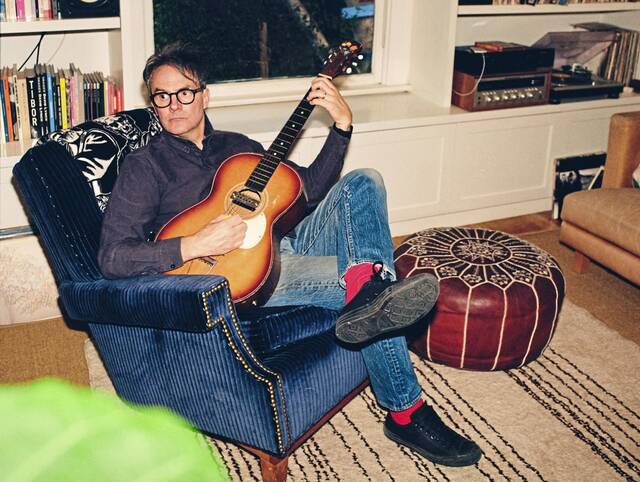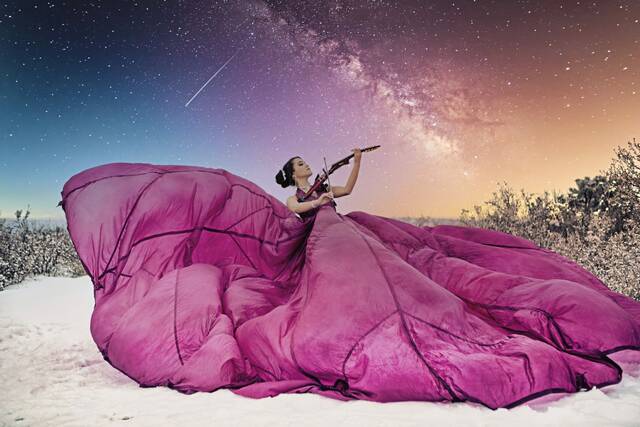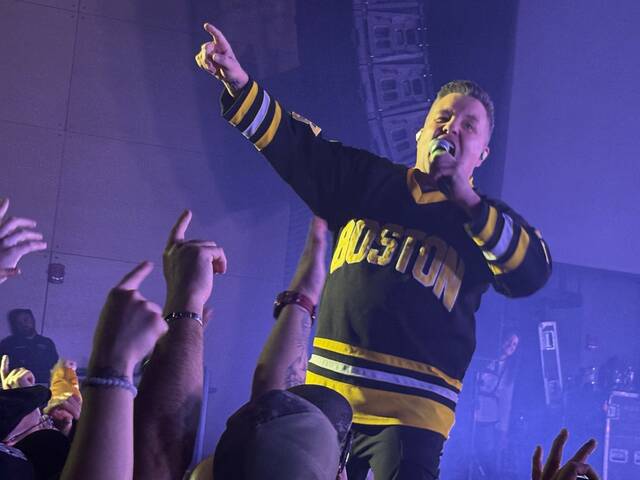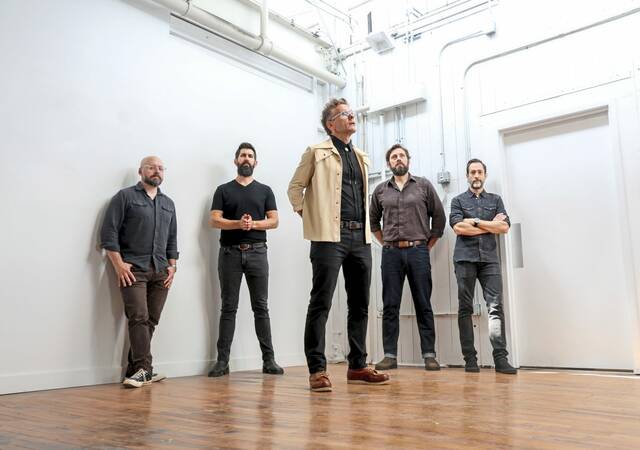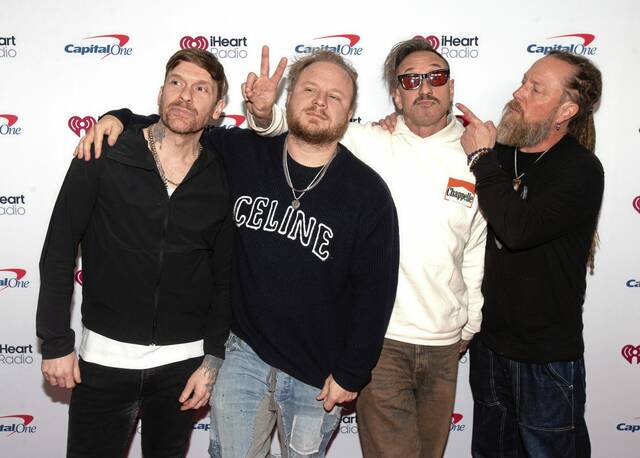The Brook & the Bluff, a Nashville-based, Alabama-raised indie folk band, just recently passed 200,000 miles in their touring van on their way to Colorado.
“Thinking about how big that number is, it’s pretty crazy,” said frontman Joseph Settine.
“I want to know how many hours we logged in that van,” added guitarist Alec Bolton.
In just about five years, the five-man band has crisscrossed the nation in their Ford van, sometimes crammed with up to 10 people, as they hit the road in support of 2021’s “Yard Sale” album and now on their Bluebeard tour. They’ll visit the Roxian Theatre in McKees Rocks on April 9, with Hotel Fiction and The Roof opening the show.
In a recent break from touring, Settine and Bolton — the band’s founders — joined a Zoom call from Nashville to discuss the new “Bluebeard” album, the record vs. the live experience and more:
What’s the worst thing that’s happened out on the road?
Settine: The reason that we got the van was our first car broke down in the first 45 minutes of a nine-hour drive. It wasn’t even that bad, it was kind of funny. We had to call a tow truck. We were playing a free show in somebody’s garage or something like that so it was easy. We canceled it, but we had to wait for a while by the side of the road for a tow truck, and there’s like five of us in this one little tow-truck cab, and we just had to ride back for almost an hour to Nashville. We talked to the tow truck driver and he was honestly awesome. He was in a 90s band that had gotten signed, played us his CD, and it was pretty cool. It was just unfortunate that was the day that we lost our car Shelby, which is what the song’s named after.
Congrats on the new album. What can you tell me about “Bluebeard?”
Settine: There’s so many things I could say. I feel like they’re all trying to get out of my mouth at one time. For me, it’s the best, my favorite experience that we’ve had as a band. And I think it comes across in the music. We spent 10 days recording like 10 of the 12 songs in a cabin, just the five of us and our producer and engineer. And it was just like adult summer camp in the best way. It’s the closest I’ve felt to being free and like a kid or something like that, which I think is really important as humans and as adults in the world too as we shift into being more of that, like getting past 30. For me, it just represents this experience where I felt kind of — not young again because I’m not old — but I felt the freedom of childhood in a way and I think that especially in America, and in the world in general, we’re really conditioned to forget that feeling and to focus on work or to make that to define your life. And I think that it should kind of be the opposite. So for me, this album has come to represent that, when I look back on it now after being out for a few months and touring it and stuff like that, this feeling that I always want to go back to.
“Bluebeard” was recorded over 10 days. Was that a quick process for you or was that normal to record the whole album?
Settine: So fast, I would say. The songs were ready to go. The first two records and the EP took us years to finish just six songs because we remixed and remixed. And the first two records, we would put together over the process of months when we could get in the studio, when we had enough money or whatever. But this one, we were like, let’s dedicate this time. We’ll get the songs ready before we go and then we did almost all of it in the 10 days, and the work pace was honestly kind of insane, we put Micah (Tawlks) and Brad King, our engineer, through a lot, but it was fun. We were all down (for it), but we would work from like 10 a.m. to 1 a.m., 1 or 2, almost every day. It’s just a lot of time.
Bolton: You just wake up, get a cup of coffee together, have breakfast, and then you’re already in the studio.
Settine: Yeah, somebody makes a bunch of sandwiches for lunch or orders from the Mexican spot down the hill, and it was just really easy and really communal. It all felt really wonderful.
If you had to pick one song off the album for somebody to listen to, that maybe does the best representation of the band, what would that be for each of you?
Settine: For me, it’s the first song on the record, “Normal Things.” That song was written up there when we had a retreat before doing the whole record, and for me that song is like the feeling that I was talking about, is captured in that song. Every time I listen to it, I feel that release and I feel like I’m walking back into the house or walking through that gateway. So “Normal Things” for me.
Bolton: I feel like “Knock” is the one that comes to mind because when we were writing, we actually finished writing that song at the mountain. We had done a writing retreat at the same mountain house earlier that year and finished writing that song, but it went through several variations, and it took us all getting in a room and passing a guitar around and working together to figure out how to make this song what it could be. I think it just always felt like it represented this collective community effort to craft something in the same way that we did the actual record, but on like a song level.
There seems to be definitely an emphasis on vocals, so does that put an even bigger importance on the lyrics, because people are definitely going to paying attention to that?
Settine: I take a lot of time to make sure to finish them or put them together. It’s the thing that, as a listener, I’ve always gravitated to, really great writing and strong lyrics. That’s just where it starts. And then from there, we do a lot of things when we’re recording that will maybe accent from a technical perspective sometimes. There will be a moment where we’re trying to figure out what’s this drum hit? I’ll be like, oh, this is the lyric right here, hit along with the rhythm of the lyric or something like that. In choir I learned it’s called text painting where a composer will try and basically match the music to what the words are saying, and I think that’s kind of a guide for me as a writer. That’s been always a strong concept in the way that I approach the songs.
Do you think that the album captures the energy of the live show or is the live show just something totally different?
Settine: That’s a great question. We’ve kind of been talking about that a little bit on this tour. I feel like it’s a little bit of both. I feel like the live show takes what we’ve captured and we just try and amplify it a little bit and raise the energy so that it’s even more — I mean electric isn’t the right word but so it is more just like there — so it vibrates a little more or is just more present in the room. We try and just take it and make it more tangible, night to night, I guess.
Bolton: Yeah, like make it come alive. There’s like an energy, it’s in a way that makes us really pumped while we’re playing too.
Settine: And there’s definitely been some different approaches. Like live, we’re all playing together and reacting off of each other. And some of the ways that we’ve done the records, we’ll lay down instruments first and then vocals will go very last. So there’s things that you can react to in a live setting when you’re playing the song that didn’t happen on the record and that’s not necessarily a positive or a negative thing, it’s just a different thing about the live show that’s good. I think also when we approach the songs in the studio it’s just from maybe a more nerdy perspective because we just noodle a lot and we really work on the parts and stuff like that.
Bolton: It’s like painting on a canvas, but in a studio you have a lot more colors to paint with.
Settine: John’s got one drum set live, so it’s like, all right, how do we make that sound great on every song?
Related
• The Driver Era dazzles Pittsburgh during opening night of North American tour• Andrea Bocelli, Chappell Roan, Tim McGraw highlight April's top Pittsburgh concerts
• 2024 Pittsburgh area concert calendar
How do you connect with the audience during shows? Is that something that you pride yourself on? Just from seeing the live videos, it seems like the crowd’s really into it.
Settine: Honestly, I am scared most shows. I have my eyes closed a lot and I tell people I’m holding on for dear life. And I think for me it’s about our interaction together and making that an interaction with everybody in the room. If we’re having fun — the five of us on stage — and if it shows that we’re together having fun on the stage, then I think it kind of radiates out through the rest of the room. And then another thing too is just the singing. There’s a really powerful quality in groups of people singing together, and that’s part of what makes our shows fun is it’s encouraged. Everybody on stage is singing, so if you know the words, you might as well be doing it too.
So it’s like a big communal experience then?
Bolton: That’s what we hope at least, and you feed off each other. I feel like it’s different every night. Sometimes there are some nights where you’re gonna be more tired than others but I’m like, OK, is it us that has to give the crowd the energy then we feed off it, or is it vice versa? And it’s probably somewhere in between, but there’s no set methods. Usually if you can find some people in the crowd though that are pumped and lock in with him, if you have one of those moments, it just gets you more pumped to do it with everybody.
What’s the rest of the year hold for the band?
Settine: Honestly after this tour we’ll probably go back into hibernation a little bit. We’ve done a lot of shows in the last four months or so … We’ll just focus on the next thing, which is another record. We’ve got some songs that we have recorded in the period of time when “Bluebeard” was finished coming out, but we’re still working with this stuff. Honestly, just focusing back on that, kind of getting back together, writing, life experience. Do some stuff that isn’t related to touring or being in a band and come back together and see what the next record is going to be.




